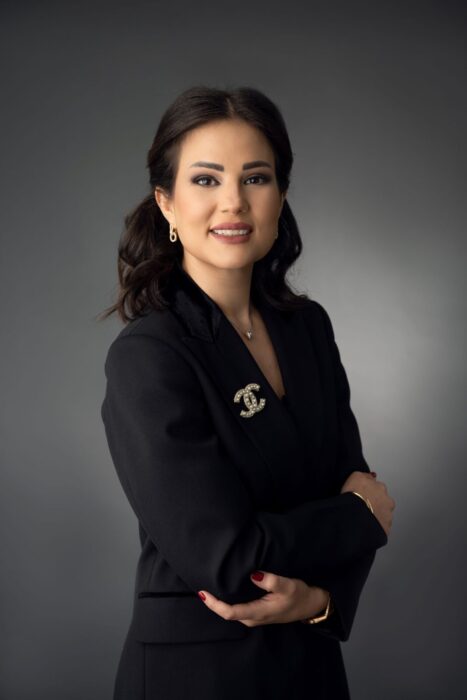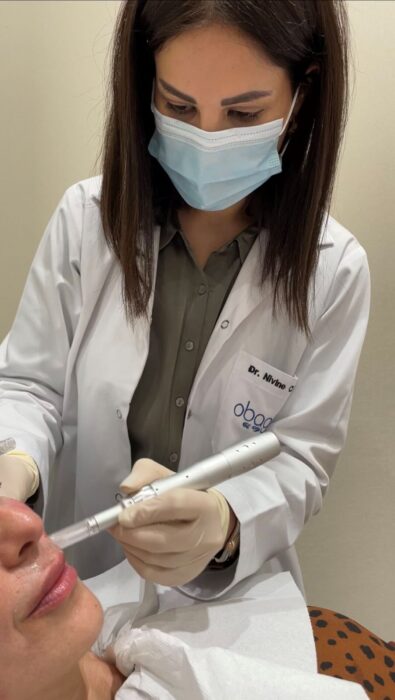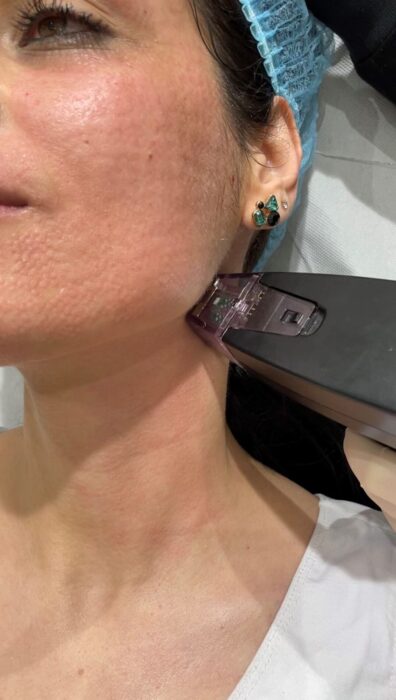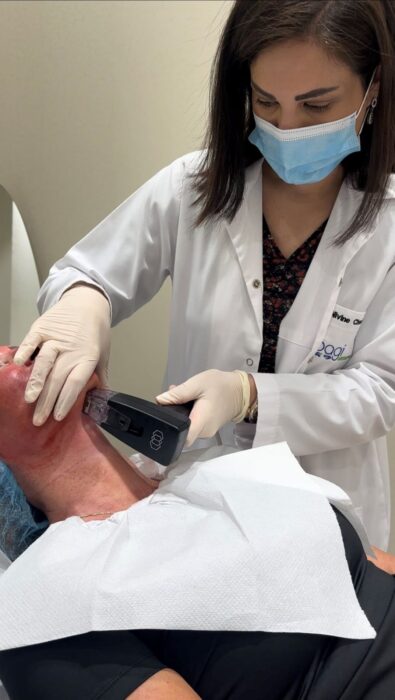Unleash your inner glow with Obagi’s innovative skincare products and treatments
Veronica Martin caught up with Dr Nivine Cheaito, Family Medicine Specialist, Canadian board of Aesthestics and anti-aging medicine at Obagi MediSpa, to discuss the tailored treatments they offer to address specific skin concerns, how safe mesotherapy and micro needling are during pregnancy and how important is for mothers to take care of their skin regularly.

What is the process for selecting the right Obagi skin care products for an individual’s skin type and concerns?
Obagi provides transformational skin care products formulated to minimize signs of aging, dark spots, hyperpigmentation including melasma, fine lines and wrinkles, to treat acne and acne scars, and to protect and enhance skin tone and texture. Obagi’s range of skincare products is vast and suitable for all skin types. The selection of the right skincare product that is suitable for your skin type and concern starts with, a detailed consultation with the skincare specialist; after examining your skin, evaluating the risk factors, and discussing the lifestyle habits, the medical professional at Obagi Medi Spa recommends the best products and skincare regimen for your specific needs.
The method of application, the dosage and the potential side effects are clearly discussed at the clinic and the duration of treatment is individualized. Beside the Cleanser, the toner, the exfoliator, the hydrating lotion, and the sunblock, different Obagi skin lightening agents help in making your skin softer, smoother, and radiant.
Can Obagi medical spa treatments be customized to address specific skin concerns, such as acne or aging?
Obagi offers a range of skincare products and medical treatments that can address both acne and aging concerns.
For acne, Obagi medical offers the Clenziderm system that can help to clear and prevent breakouts. The main ingredients are salicylic acid and benzoyl peroxide to help unclog pores and reduce inflammation.
Beside the home care routine, different chemical peels applied at the clinic, including Obagi blue peels, are not only great in treating acne, but also in reducing acne scarring and uneven skin tone. Chemical peels for acne typically use alpha-hydroxy acids, beta-hydroxy acids, and TCA. It works by exfoliating the top layer of the skin and therefore improving overall skin texture and tone.

Q switched lasers can be an effective treatment for acne as well. By targeting the sebaceous glands in the skin, the laser can help to reduce the production of sebum, which contributes to the development of acne. By targeting the pigment in the skin, the laser improves the appearance of acne scars and reduce post inflammatory hyperpigmentation (PIH) associated with acne.
In terms of addressing aging concerns, the Nu-derm system includes a range of products designed to improve skin texture, stimulate collagen production, and reduce the appearance of fine lines and wrinkles.
As for the treatments at Obagi MediSpa, there are several aesthetic clinic procedures than can address aging. Some of the most common treatments include; neuromodulators or “Botox”, hyaluronic acid dermal fillers, biostimulators such as Sculptra and Radiesse fillers, skin tightening treatments such as radiofrequency (Morpheus8) and ultrasound (Ultherapy), and laser resurfacing treatments which stimulate collagen and elastin production, resulting in smoother, firmer and more youthful-looking skin.
How safe is mesotherapy for a mother who is breastfeeding?
Mesotherapy involves injecting or dermal rolling nutrients, including amino acids, vitamins, and hyaluronic acid, into the skin to treat various conditions such as wrinkles, skin dehydration, hyperpigmentation, cellulite, and hair loss.
The safety of mesotherapy during breastfeeding is not well established; there is limited research available. It is possible that some of the substances used in the mesotherapy cocktail could be transferred to breast milk and potentially harm the baby. Therefore, it is generally recommended that breastfeeding mothers avoid mesotherapy.
It is important to note that there are many treatments that can address skin conditions like mesotherapy. Platelet-Rich-Plasma (PRP) could be a safe alternative treatment for the breastfeeding mothers looking for a rejuvenating, hydrating, or skin boosting treatment.

Can micro needling be done during pregnancy?
Micro needling is a minimally invasive cosmetic procedure that involves pricking the skin’s surface with tiny needles. The puncture or micro injuries stimulate the body’s natural healing process, resulting in the production of collagen and elastin which mainly helps improving the appearance of acne scars, wrinkles, and fine lines.
It is important to prioritize the health and safety of both the mother and baby during pregnancy. The research on the safety of micro needling during pregnancy is limited, and it is generally not recommended. Micro needling radiofrequency causes slight trauma to the skin while delivering energy, which can potentially affect the developing foetus, especially during the first trimester.
In addition, women run a higher risk of skin hyperpigmentation or melasma during pregnancy due to the fluctuation in the levels of hormones, and the micro needling treatment could be one of the potential risk factors.
It is always advisable to consult with your healthcare provider before undergoing any cosmetic procedure including micro needling during pregnancy.
How many sessions of micro-needling are typically needed to see results?
Micro needling can be performed at Obagi MediSpa using different devices, including rollers or derma pens and Morpheus8. It is also used to enhance the penetration and absorption of vitamins, amino acids, growth factors and hyaluronic acid.
The depth of the needles used in each session and the number of sessions needed, depend on the specific skin concerns being addressed, the age, and the individual’s skin type and condition. In general, a series of 3 to 6 treatments (scarring skin) spaced 3 to 4 weeks apart is recommended for optimal results.
Patients will note improvement in their skin after just one treatment, and the collagen and elastin production stimulated by the microneedles can continue for several weeks after each treatment, resulting in gradual improvements in skin texture, tone, and appearance.
A proper consultation with the aesthetic physician is important to establish a treatment plan tailored to your specific needs.

How important if for mothers to take care of their skin regularly?
It is crucial for all individuals including mothers, to take care of their skin regularly. Proper skincare can help maintain the skin’s barrier function, improve its overall health and appearance, and address common skin concerns such as dryness, wrinkles, and acne.
First, mothers may face additional skin concerns related to pregnancy, breastfeeding, and hormonal replacement therapy. They are at increased risk of hyperpigmentation, stretch marks, dryness irritation and loss of skin laxity. Regular skincare can help promote healthy, radiant, and glowing skin.
Second, for the mothers’ caregivers who may be juggling different responsibilities, skincare is part of self-care. It boosts confidence and self-esteem and improve overall well-being. By just cleansing and moisturizing the skin, mums feel more relaxed and refreshed.
Third, moms play an influential role in their children’s lives. By prioritizing skincare, mums can set a positive example for their children, instilling healthy skincare habits from a younger age.
At the end, caring for the skin regularly can have numerous benefits, including maintaining its health, preventing skin issues like acne and age spots, combating signs of aging, and promoting a youthful appearance.












Comments